
13.2 CARBON ENERGY USE
1. of low-carbon energy used
- King Mongkut’s University of Technology Thonburi (KMUTT) has established a comprehensive Greenhouse Gas (GHG) Emissions Reduction Program as part of its strategic roadmap toward achieving Carbon Neutrality by 2040. This program embodies the university’s commitment to sustainability, environmental stewardship, and alignment with Thailand’s national targets and the United Nations Sustainable Development Goals (SDGs), particularly Goal 7 (Affordable and Clean Energy) and Goal 13 (Climate Action).
KMUTT recognizes that universities play a vital role in shaping a low-carbon society through knowledge creation, innovation, and real-world application. Therefore, the university integrates carbon management practices across all dimensions of its operations including energy generation, building design, waste management, transportation, and research activities. The GHG reduction framework focuses on both mitigation (reducing emissions) and adaptation (enhancing resilience) strategies, supported by accurate monitoring, reporting, and verification (MRV) systems.
- Energy Transition and Renewable Integration
KMUTT promotes the transition from fossil fuel dependence to renewable energy sources through the installation of solar rooftop systems across multiple campuses, including Bangmod, Bang khun tein, and Ratchaburi Learning Park. The current installed capacity exceeds 300 kW, providing clean electricity and reducing grid-based carbon intensity. The university continuously expands renewable energy production with the goal of achieving 100% renewable electricity consumption by 2040. Energy-efficient appliances, LED lighting systems, and smart energy monitoring are widely implemented to minimize electricity use and optimize operational performance.
- Green Building and Sustainable Infrastructure
Newly constructed and renovated buildings at KMUTT, such as the Learning Exchange (LX), Utility Exchange (UX), Knowledge Exchange (KX), and Bioprocess Research and Innovation (BRI) buildings, are designed following international green building standards (LEED and TGBI). These buildings incorporate energy recovery systems, natural ventilation, radiant cooling, and green roofs, which collectively reduce energy consumption and improve indoor air quality. Green building practices contribute significantly to lowering both direct and indirect GHG emissions from campus operations.
- Low-Carbon Transportation and Mobility
To reduce emissions from campus commuting, KMUTT promotes low-carbon transportation systems, including electric shuttle buses, carpooling, and bicycle-sharing programs. Dedicated pedestrian walkways and electric vehicle (EV) charging stations are also integrated within the campus infrastructure. These initiatives aim to reduce vehicle emissions, improve air quality, and enhance accessibility for students and staff.
- Waste and Resource Management
KMUTT implements a Zero Waste to Landfill policy through effective waste segregation, recycling, and composting programs. Organic waste from campus canteens is converted into biogas or fertilizer, while laboratory and hazardous waste are handled through certified treatment processes to prevent environmental contamination. Water-saving fixtures, greywater recycling, and rainwater harvesting systems also support the reduction of the university’s overall carbon footprint.
- Research, Innovation, and Carbon Sequestration Projects
Beyond operational reductions, KMUTT actively engages in research-based carbon management, including projects on carbon capture, utilization, and storage (CCUS), biochar applications, and mangrove forest carbon sequestration modeling. These initiatives not only enhance scientific knowledge but also provide real-world carbon offset opportunities. The university collaborates with local communities and governmental agencies to restore coastal mangrove ecosystems, which serve as natural carbon sinks under the KMUTT Carbon Sink Initiative.
- KMUTT Carbon Neutrality 2040 Roadmap
In alignment with Thailand’s Net Zero 2065 target, KMUTT has set an ambitious goal to achieve Carbon Neutrality by 2040, 25 years ahead of the national target. The roadmap emphasizes five key action areas:
Energy Transformation increasing renewable energy share and improving energy efficiency.
– Sustainable Infrastructure expanding green building standards to all facilities.
– Carbon Management System developing precise carbon accounting and monitoring tools.
– Offset Mechanisms promoting campus-level carbon sinks through reforestation and soil carbon storage.
– Education and Awareness integrating sustainability and carbon literacy into curriculum and research programs.
This comprehensive approach ensures that KMUTT not only reduces its emissions at the source but also builds a culture of environmental responsibility and climate resilience throughout its community. The Carbon Neutrality 2040 initiative positions KMUTT as a leader among Southeast Asian universities in advancing higher education’s role in climate action and sustainability transformation..

Charge Parking

Renewable Energy
King Mongkut’s University of Technology Thonburi (KMUTT) has been a leading institution in Thailand’s transition toward sustainable and renewable energy utilization. With its strong commitment to achieving carbon neutrality by 2040, KMUTT has continuously developed, implemented, and promoted renewable energy systems across its campuses. These initiatives not only contribute to environmental sustainability but also serve as a practical learning platform for research, innovation, and community engagement. KMUTT integrates various renewable energy technologies within its infrastructure. The university has established solar photovoltaic (PV) systems on rooftops and open spaces to generate clean electricity for academic and residential buildings. The energy produced is managed through smart energy systems to optimize load distribution and minimize dependency on fossil fuels. In addition, solar thermal energy is utilized for water heating and drying processes, particularly in research related to solar drying technologies for agricultural products.

Bike sharing and rental
King Mongkut’s University of Technology Thonburi (KMUTT) has long been recognized as a leading university in Thailand promoting sustainable mobility and environmental consciousness. Among its many green initiatives, the Bike Sharing and Rental System stands out as one of the most successful programs integrating eco-friendly transportation with community engagement, energy efficiency, and health promotion. This initiative aligns with KMUTT’s broader sustainability policy and its Carbon Neutrality 2040 goal, reflecting the university’s dedication to reducing greenhouse gas emissions and fostering a sustainable campus lifestyle.

Promotion Activities
King Mongkut’s University of Technology Thonburi (KMUTT) has undertaken a wide range of promotional activities to raise awareness, engage its community, and drive action toward its goal of Carbon Neutrality by 2040. These activities span policy, student engagement, infrastructure, research, and public outreach. Below are some of the key promotion activities such as Policy Commitment & Institutional Strategy, Certifications and Recognition, Awareness, Participation & Student Engagement, Campaigns & Behavioral Change and Events, Expos, and Exhibitions etc.

Zombike
King Mongkut’s University of Technology Thonburi (KMUTT) has long been recognized as one of Thailand’s leading green universities, integrating sustainability into its academic, operational, and social practices. One of the most creative and impactful initiatives that reflects KMUTT’s strong environmental commitment is the Zombike Project, a campus-wide bicycle reuse and sharing program designed to promote sustainable mobility and reduce the environmental footprint of university transportation.


King Mongkut’s University of Technology Thonburi (KMUTT) has consistently positioned itself as one of Thailand’s leading green universities, dedicated to promoting sustainability and carbon neutrality within its campuses. As part of KMUTT’s commitment to achieving Carbon Neutrality by 2040, the university has introduced several innovative transportation initiatives designed to reduce carbon emissions, energy consumption, and pollution. Among these initiatives, the Electric Vehicle Bus (Hop On–Hop Off) system has emerged as one of the most prominent and visible symbols of KMUTT’s sustainable mobility transition. The project aims to provide a zero-emission, convenient, and inclusive mode of transportation for students, staff, and visitors across the Bangmod and Bangkhunthian campuses. The “Hop On–Hop Off” concept refers to a flexible, open-route transportation system that allows passengers to board or leave the bus at any designated stop along a fixed loop. Unlike conventional bus services that follow fixed point-to-point schedules, the Hop On–Hop Off model provides more convenience and freedom for users moving between academic buildings, dormitories, canteens, and laboratories within the university area. The introduction of electric buses reflects KMUTT’s strategy to integrate clean energy technology, low-carbon mobility, and smart campus management into everyday university life. This system not only reduces the dependency on private vehicles but also enhances accessibility and safety for the university community, while aligning with the global Sustainable Development Goals (SDGs), particularly SDG 7 (Affordable and Clean Energy), SDG 11 (Sustainable Cities and Communities), and SDG 13 (Climate Action).

Electric Motorcycle Charging Station
King Mongkut’s University of Technology Thonburi (KMUTT) has long been recognized as a leading institution in promoting sustainability, clean energy innovation, and environmentally responsible mobility solutions. One of its remarkable initiatives under the university’s Carbon Neutrality 2040 Policy is the development of the Electric Motorcycle Charging Station, a project designed to support the growing number of electric vehicle (EV) users and to encourage the transition toward low-emission transportation within the campus.
The Electric Motorcycle Charging Station project is part of KMUTT’s broader Green Campus and Smart Mobility Program, which integrates renewable energy systems, digital monitoring, and sustainable transportation management. The charging stations are strategically installed in key areas such as the Student Dormitory Zone, Knowledge Exchange (KX) Building, and School of Energy, Environment, and Materials (SEEM). These stations provide easy access for students, faculty, and staff to charge their electric motorcycles conveniently and efficiently during the day.

Electric Car Charging Station
King Mongkut’s University of Technology Thonburi (KMUTT) has emerged as a leader in sustainable transportation within Thailand’s higher education sector. As part of its commitment to achieving carbon neutrality by 2040, the university has developed a comprehensive electric vehicle (EV) infrastructure, including strategically located electric car charging stations across its campuses. KMUTT’s electric car charging stations are situated in key areas, such as the Knowledge Exchange (KX) Building, the Office of the President, and Energy Environment Safety and Health Center (EESH) . These stations are equipped with advanced charging technologies, including Delta DC Wallbox chargers, which were installed in collaboration with Delta Electronics (Thailand). The installation of these EV charging stations aligns with KMUTT’s broader sustainability goals, contributing to reduced greenhouse gas emissions and promoting clean energy usage. The university encourages the adoption of electric vehicles among students, faculty, and staff by providing convenient and reliable charging options. Furthermore, KMUTT’s involvement in projects like the MEA EV Smart Charging System underscores its role in advancing smart grid technologies and public charging infrastructure


15 sets of solar cell have been installed in KMUTT including
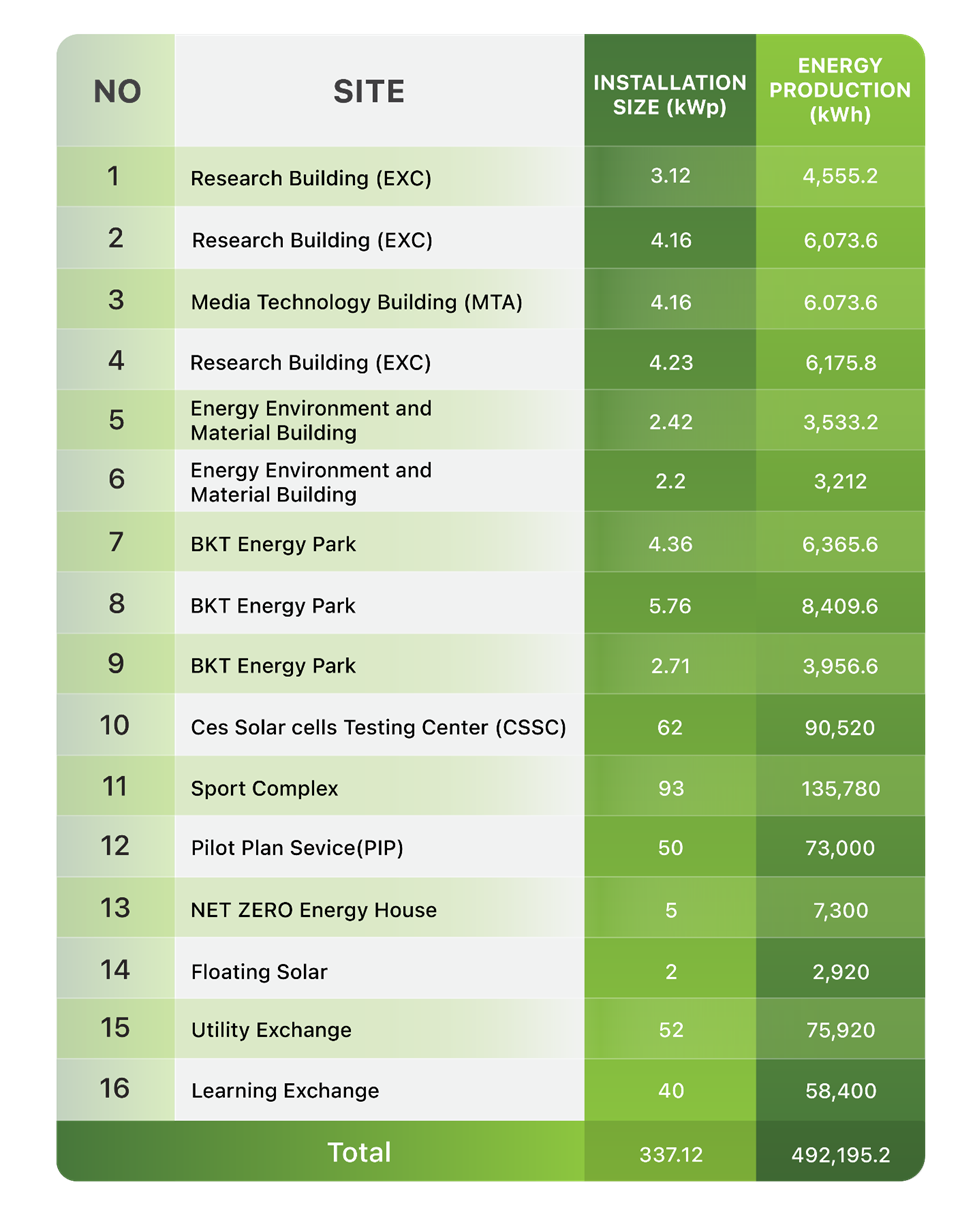
13.3 ENVIRONMENTAL EDUCATION MEASURES
1. Related information on our university providing local education programmer or campaigns on climate change risks, impacts, mitigation, adaptation, impact reduction and early warning.
At KMUTT, our researchers have access to a wide range of resources which allow them to achieve their research ambitions on carbon footprint and greenhouse gases emission topics. School of Energy, Environment and Materials and The Joint Graduate School of Energy and Environment are the main school of university where study on climate change and environmental sustainability. Greenhouse Gas Emissions from Low Income House Construction in Thailand is one example of greenhouse gases research study by applying Life Cycle Assessment theory to calculate carbon emission during construction process.
KMUTT has focus on integrated sustainable concept into curriculum, also provide scholarship for Energy and Environmental study with more than ten years. This contribute our students and staff understanding on the complex issue of sustainability which related to climate change adaptation and mitigation, energy conservation, renewable energy, waste management, water management and green transportation. By transforming our campuses to be an ideal environment, its developing awareness and innovative solutions to students. KMUTT provides a huge range of support for research staff, ranging from help finding funding, to career advice, to guidance for new principal investigators which related to 7 topics including with
(1) Bioeconomic
(2) Smart Manufacturing and Construction
(3) Sustainable Energy and Environment
(4) Sustainable Mobility
(5) Smart Healthcare
(6) Digital Transformation
(7) Innovative and Creative Learning Society.

Local education programmes on climate
1. Development of Thailand’s Air Pollutants and Greenhouse Gases (GHGs) Emission Inventory and Projection for Air Quality Simulations and Future Energy Related Emission Reduction Assessment (Phase VII)
This project aims to develop Thailand’s air pollutants and greenhouse gases (GHGs) emission inventory and projection for use in air quality models, in order to (1) assess air quality related issues at national and regional levels, in particular surface ozone and haze pollutions; (2) evaluate level and trends of key emission sources in Thailand against global and regional emission datasets; (3) document effective emission mitigation options to reduce ozone and haze pollution from energy related sectors over Thailand by developing future emissions under different future national energy demand scenarios; (4) evaluate cost-effectiveness or cost-benefit of emission mitigation options through source-receptor relationship analysis using air quality simulations outputs. The outputs and outcome of this project have been used by Pollution Control Department (PCD) to support air quality management policy measures formulation.
2. Estimation of Emission Reduction Potential of Air Pollutants from the Transportation Sector in Thailand
This study aims to better understand the situation of air pollution caused by the transportation sector in Thailand and to grasp an emission reduction potential by introducing emission mitigation measures such as Euro 5/6 in the country. Study results are to be submitted to the Ministry of the Environment of Japan as one of discussion items between the Government of Japan and the Government of Thailand in the environmental management field.
3. Precipitation Modeling in Greater Bangkok with Impact of Urbanized Land Cover and Air Oollution using WRF-Chem-UCM-GBK
This study prepared and configured WRF–Chem–UCM–GBK, a modeling system for advanced precipitation modeling in Greater Bangkok. It incorporates updated land–related data and urban parameters from our previous studies, and the latter supports the use of Single-Layer Urban Canopy Model. For emission data, they include a local inventory for GBK and a global inventory for areas outside GBK. Biogenic and fire emissions were also computed using available WRF-Chem processors. Three precipitation events selected for modeling are a general event in the summer (EV1), a general event in the wet season (EV2), and a heavy event in the wet season (EV3). Two double–nested domains at 10–km and 2–km resolutions and a set of physics and chemistry options were employed. Observation data from a network of stations and satellite-based precipitation data were used to evaluate model performance. For EV1, characterized by frontal precipitation over one single day, the model fails to produce precipitation over GBK due possibly to inability to capture frontal passage temporally. For EV2 and EV3, overall the model performs fairly. Due to the poor model performance in EV1, no reliable assessment can be made for the effects of urban physics and emissions for this event. Turned–off urban physics alone for EV2 tends to give more precipitation within and around GBK systematically partly because moisture is more easily transported to urban perimeters due to less surface roughness and no anthropogenic heat and heat storage by infrastructure are present to enhance convection within GBK. For EV3, abundant moisture dominantly regulates precipitation processes, precipitation difference then becomes less systematic. Turned–off emissions alone in EV2 tends to produce more precipitation within and around GBK, attributed partly to less aerosols to compete for available moisture and in turn large cloud droplets are more viable. But EV3 has less precipitation within GBK due partly to less aerosols to take up moisture to form clouds under the abundant moisture condition. Both turned–off urban physics and emissions appears to give the synergetic effects. These findings directly suggest the effects to be dependent on the type of precipitation event. In the end, a number of recommendations for future work are given.
4. Bilateral Cooperation Between Japan and Thailand on Air Quality Improvement for Thailand
This report aims to synthesize the processes and outputs/outcomes from the bilateral cooperation between Japan and Thailand on air quality improvement for Thailand, based on the results and achievements of the 2- year project entitled the Japan-Thailand Clean Air Partnership (JTCAP) Phase I, conducted during the Japanese fiscal years 2018 and 2019.

Training on Simple Energy Conservation Techniques and Dissemination of the Energy Management System at KMUTT for Students
On Monday, September 1, 2025, from 1:00 – 4:00 p.m., King Mongkut’s University of Technology Thonburi (KMUTT), through the Energy Environment Safety and Health Center (EESH), organized a workshop on “Simple Energy Conservation Techniques and Dissemination of the Energy Management System at KMUTT” at the Auditorium, 3rd Floor, Learning Exchange (LX) Building. The session was delivered by Mr. Natthawat Wisaiprom, Engineer.
The training aimed to enhance knowledge and understanding of daily energy conservation practices while introducing the university’s Energy Management System (EnMS). The workshop presented techniques for efficient energy use, behavioral changes to reduce unnecessary consumption, and the integration of energy knowledge to support KMUTT’s Green University initiative. Activities included academic lectures, presentations, and practical case studies showcasing the real results of KMUTT’s energy management implementation. Participants also had the opportunity to engage in open discussions, share perspectives, and explore approaches to contribute to energy conservation both within the university and in their daily lives.
The workshop fostered a creative and collaborative learning environment, equipping participants with knowledge, understanding, and inspiration to actively engage in energy-related initiatives. This effort contributes to KMUTT’s transition toward becoming a Green University with efficient and sustainable energy use. Furthermore, the activity aligns with the United Nations Sustainable Development Goals (SDGs), particularly Goal 13: Take urgent action to combat climate change and its impacts, and Goal 7: Ensure access to affordable, reliable, sustainable, and modern energy for all.
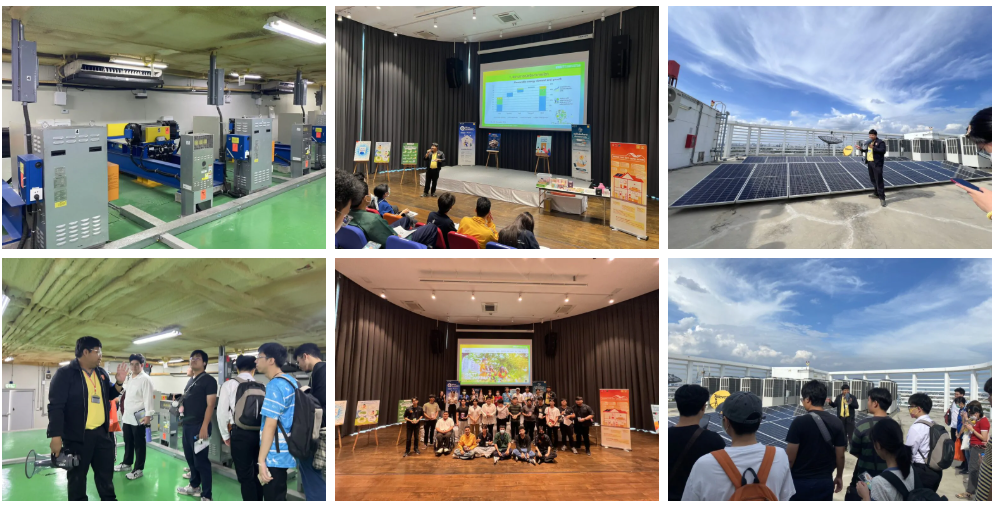
“Carbon Footprint GO GREEN Together” Workshop Inspires Sustainability at Chetupon Commercial College
On August 20, 2025, King Mongkut’s University of Technology Thonburi (KMUTT), through the Energy, Environment, Safety, and Occupational Health Management Center (EESH), in collaboration with Chetupon Commercial College, organized the “Carbon Footprint GO GREEN Together” workshop at Chetupon Commercial College. The program aimed to raise awareness, build understanding, and inspire students and participants on carbon footprint reduction, efficient energy use, and KMUTT’s Green University practices. The focus was on enabling participants to apply this knowledge in daily life as well as in organizational settings.
The workshop featured guest speakers from KMUTT’s EESH Center, including Mr. Natthawat Wisayaprom, Mr. Apichart Thammajarn, and Ms. Nairat Wongwet. They shared academic insights, practical techniques for reducing greenhouse gas emissions, and real-world case studies. Activities included hands-on workshops, interactive lectures, and group discussions. Participants practiced calculating their carbon footprint, analyzed energy consumption behaviors, and proposed solutions to reduce greenhouse gas emissions.
This initiative not only fostered sustainability awareness but also encouraged active engagement from all sectors in building a sustainable environment. The workshop reflects KMUTT’s strong commitment to becoming a Green University by enhancing energy efficiency, reducing greenhouse gas emissions, and promoting a sustainable society. Participants left the session equipped with knowledge and inspiration to continuously put environmental and energy-saving practices into action.
The activity also aligns with the United Nations Sustainable Development Goals (SDGs), particularly Goal 13: Take urgent action to combat climate change and its impacts, and Goal 7: Ensure access to affordable, reliable, sustainable, and modern energy for all.
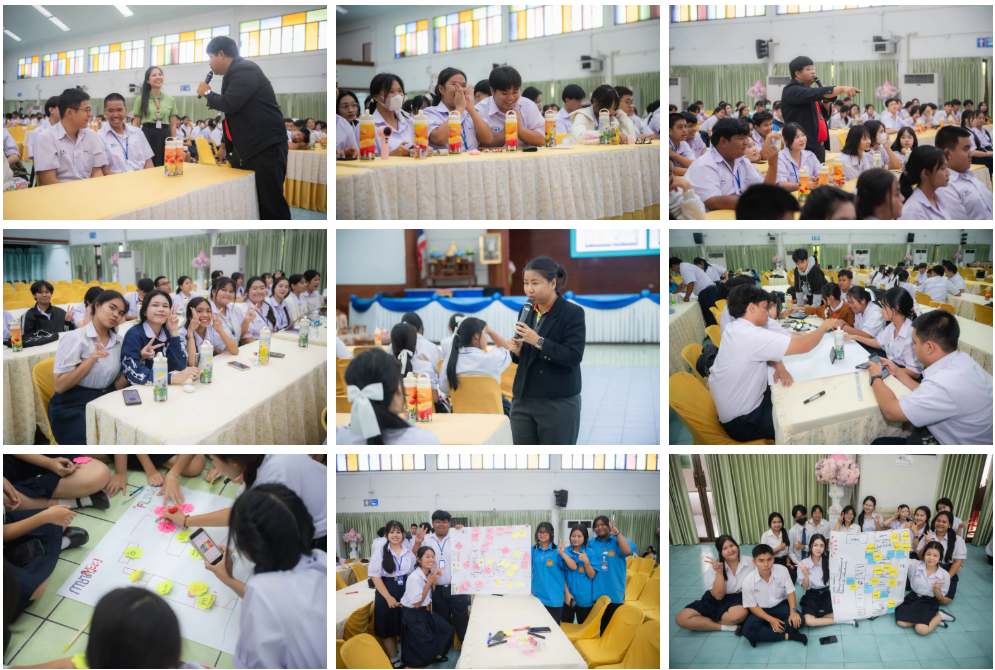
KMUTT Welcomes New Students with “KMUTT First Date 2025” Fostering Sustainability and Waste Reduction from Day One
On July 20, 2025, the Student Government Organization of King Mongkut’s University of Technology Thonburi (KMUTT), in collaboration with various university departments, hosted the orientation event “KMUTT First Date 2025” to warmly welcome incoming students. The event introduced freshmen to the university’s structure, services, and support systems, while fostering connections among peers and senior students in a friendly, inclusive atmosphere. More than just a welcome event, the program strongly reflected KMUTT’s dedication to sustainability.
Participants were encouraged to bring their own reusable water containers and avoid single-use foam or plastic food containers, opting instead for reusable tableware to help reduce waste from the event. In addition, a volunteer waste management team was stationed at various waste disposal points throughout the venue to guide new students on proper waste separation and disposal practices. This initiative aimed to promote environmental awareness and responsible behavior from the very first day of university life. Through such actions, KMUTT continues to cultivate students as Change Agents with Green Hearts young leaders empowered to drive sustainable transformation across campus and beyond.
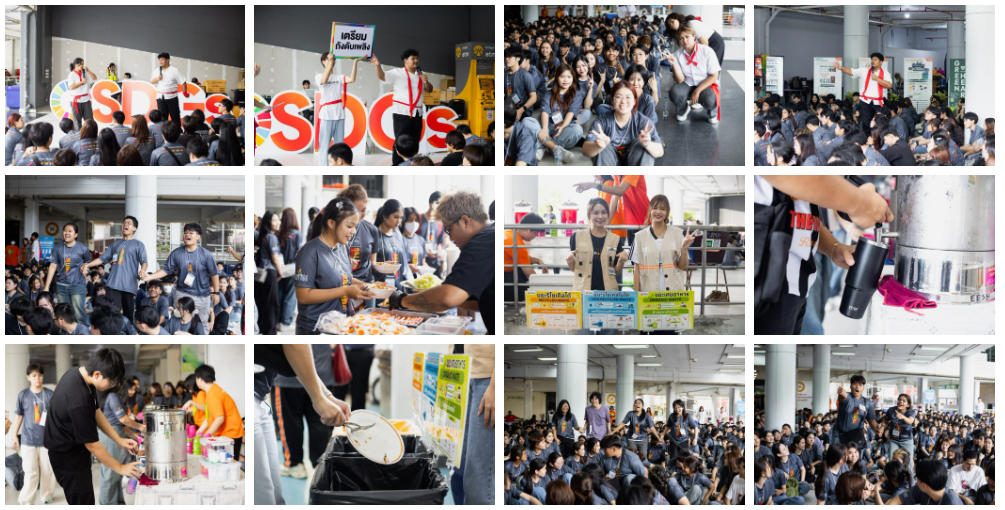
KMUTT Promotes Plastic Waste Reduction on World Environment Day 2025
On Thursday, June 5, 2025, King Mongkut’s University of Technology Thonburi (KMUTT), through the Energy, Environment, Safety, and Health (EESH) Center, organized a special event in celebration of World Environment Day 2025 under the global theme “Beat Plastic Pollution.”
The initiative aimed to raise awareness and encourage the university community to practice waste segregation at source, focusing particularly on reducing single-use plastics. As part of the campaign, students, staff, and faculty members were invited to exchange single-use plastic waste, such as plastic cups, bottles, and bags, for commemorative potted plants — a symbolic gesture promoting green living and environmental consciousness.
The activity successfully collected a total of 12.7 kilograms of waste, consisting of:
- 11.5 kilograms of plastic bottles, and
- 1.2 kilograms of mixed waste, including glass bottles, aluminum cans, and opaque plastic containers.
All collected waste will be forwarded to KMUTT’s official Waste Bank system, where it will be processed and managed in alignment with the university’s sustainable waste management practices.
The event not only fostered a sense of environmental responsibility within the campus but also underscored the importance of individual actions in combating the global plastic crisis.
The next round of the waste-for-plant exchange is scheduled for June 30, 2025, at 10:30 AM, and will be held at the Multipurpose Area, 1st Floor, Office of the President Building. Everyone in the KMUTT community is encouraged to participate and contribute to a cleaner, greener future.
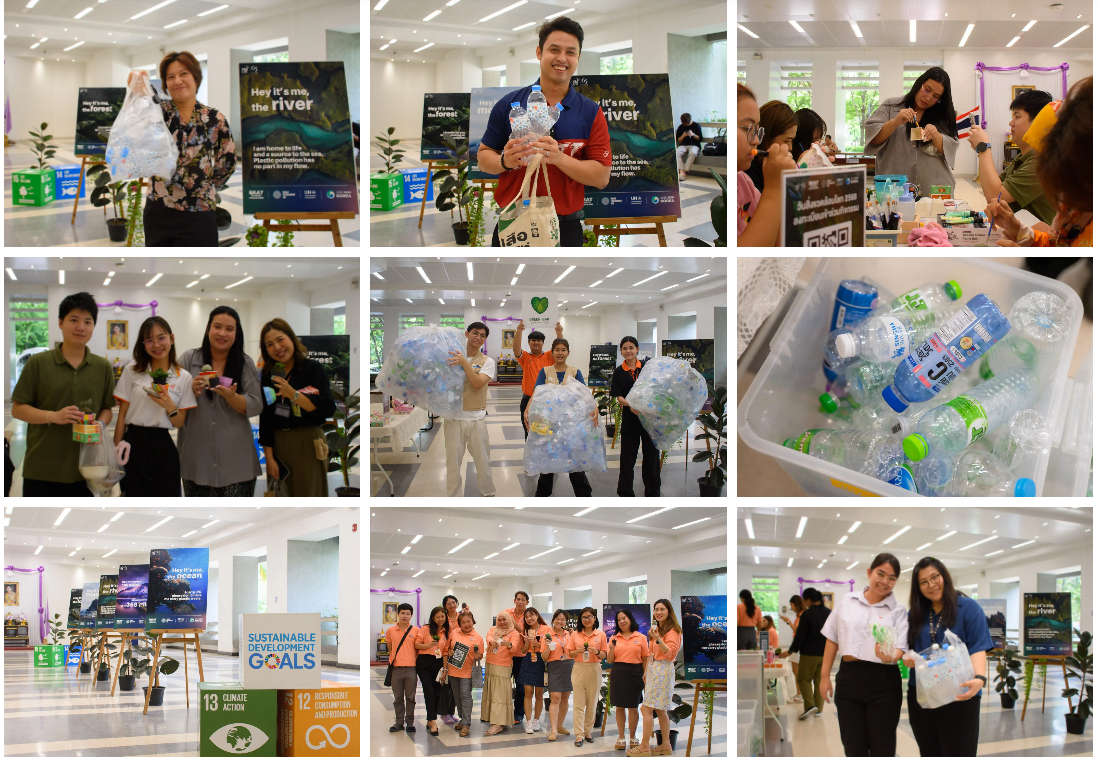
KMUTT – NSTDA and Partners Organize “Agri-PV” Seminar, Supporting Clean Energy Alongside Agriculture for Sustainable Energy and Food Production
King Mongkut’s University of Technology Thonburi (KMUTT), the National Science and Technology Development Agency (NSTDA), in collaboration with Forschungszentrum Jülich (Germany), Rajamangala University of Technology Lanna (RMUTL), the National Research Council of Thailand (NRCT), the HUB Net Zero Network, the Ministry of Higher Education, Science, Research and Innovation (MHESI), the Program Management Unit for Human Resources & Institutional Development for Research and Innovation (PMU-B), and partner organizations, organized a workshop and seminar under the topic “AGRI-PV System Design Concept: Plant/Animal Selection for Energy and Food Production” on April 24, 2025, at KX Building, Krung Thonburi Road, Bangkok. This was followed by a visit to the Agri-PV system prototype, pilot plant, energy research, and business matching discussions on April 25, 2025, at KMUTT Bangkhuntien, Bangkok.
The seminar focused on integrating solar cell (Photovoltaic) technology with agriculture to maximize land and resource utilization. Key topics included the design and performance evaluation of solar cells for agriculture, aquaculture in systems under solar panels, animal husbandry under limited energy conditions, the potential of Agri-PV in co-producing food and energy, research and development of animal feed from energy crops, and the growth trends of food/feed ingredients from Agri-PV systems.
Assoc. Prof. Dr. Suvit Saetia, President of KMUTT, delivered the opening remarks, and Prof. Dr. Navadol Laosiripojana, Director of the Joint Graduate School of Energy and Environment, KMUTT, moderated the seminar. Esteemed national and international experts presented, including Ms. Mannlika Sompranon, Director of the Solar Energy Development Division; Assoc. Prof. Dr. Janulak Khanobdee, Agricultural Technology Research Institute, RMUTL; Asst. Prof. Somkiat Tanta, Faculty of Agricultural Science and Technology, RMUTL Lampang; Asst. Prof. Dr. Usa Boonbumrung, Pilot Plant Development and Training Institute (PDTI), KMUTT; Dr. Kalyanee Paithoonrangsarid, National Center for Genetic Engineering and Biotechnology, NSTDA, PDTI, KMUTT; Dr. Matthias Meier, Institute for Plant Sciences IBG-2, Jülich, Germany; Dr. Kobkul Sriprabha, National Electronics and Computer Technology Center, NSTDA; Mr. Thitiwut Phongthanaphisal; and Ms. Kanchana Prakobphol, PDTI, KMUTT.
Furthermore, Asst. Prof. Dr. Boonyapat Subhapanich, Director of the Pilot Plant Development and Training Institute, KMUTT, along with the KMUTT Bangkhuntien team, welcomed the participants and guided them on a tour of the Agri-PV system prototype, pilot plant, demonstration plots, energy research, algae cultivation, and research ready for technology transfer. This included technologies such as Agri-PV with algae cultivation, CO2 recycling technology for precision agriculture yield enhancement, intelligent EMS technology for solar systems with batteries in Agri-PV, and exhibition booths showcasing microbial production technology in fermenters and microbial utilization, algae-based product development, technology for adding value to agricultural waste biomass (lignin and biochar production and utilization), and biodiversity for health product development at KMUTT Bangkhuntien, Bangkok.
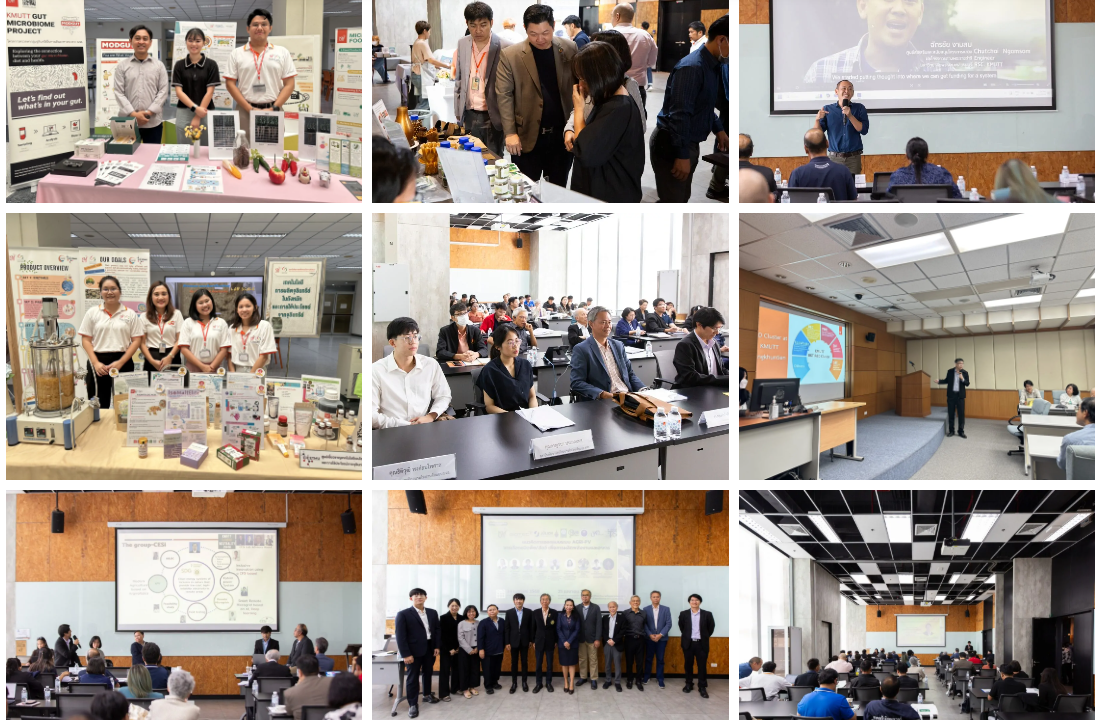
Faculty of Science Student Club Organizes the 3rd Nature and Environmental Conservation Camp (ENVI-SCI #3)
On March 15–16, 2025, the Student Club of the Faculty of Science organized the 3rd Nature and Environmental Conservation Camp (ENVI-SCI #3) at the Sai Yok Integrated Rural Development Center, Kanchanaburi Province. The camp aimed to raise awareness and instill a positive attitude toward the conservation of natural resources and the environment, with a particular focus on reducing environmental problems such as carbon dioxide emissions and increasing green spaces. This initiative aligns with KMUTT’s commitment to achieving Carbon Neutrality by 2040.
The camp also encouraged students to learn how to live in harmony with nature. The event was officially opened and closed by Asst. Prof. Dr. Nakharin Patanaboonmee, Associate Dean for Student Development and Lifelong Learning.
The camp featured a variety of educational and hands-on activities related to renewable energy and environmental conservation, including:
- Sustainable agriculture practices using solar-powered innovations,
- Biomass composting workshops for agricultural use and alternative energy,
- Soil-covering and tree-planting sessions to promote long-term forest care.
ENVI-SCI #3 attracted significant interest from faculty members, undergraduate students from all years (1st–4th year), and senior members of the student club, demonstrating the awareness and dedication of young people in taking action for environmental preservation and sustainable community development.
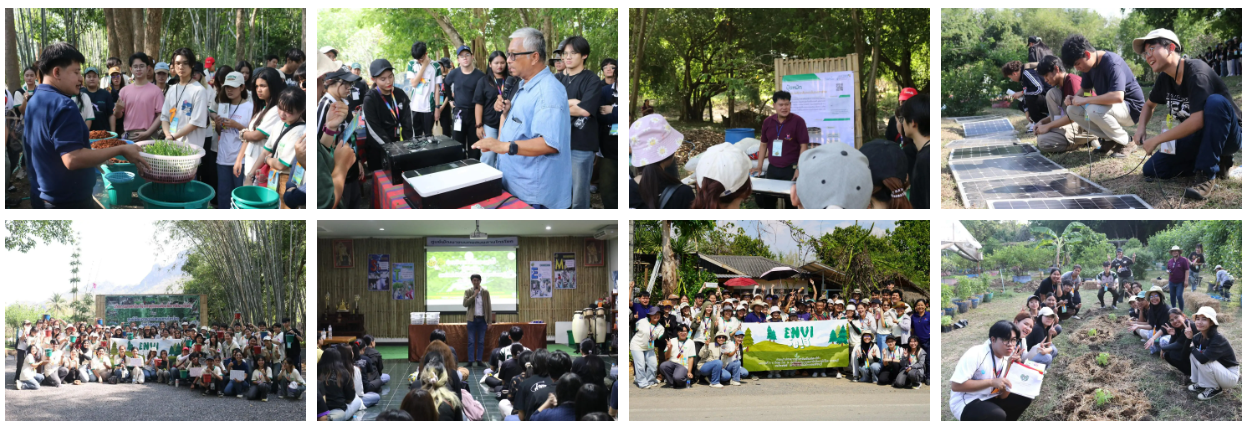
KMUTT Joins “Multicultural and Religious Harmony for Happiness” Event, Shares Knowledge on Energy, Environment, and Safety with the Community Led by GREEN HEART Student Leaders
King Mongkut’s University of Technology Thonburi (KMUTT), led by the University Relations Office and in collaboration with the EESH Center and the GREEN HEART student leaders group, participated by hosting an exhibition booth at the “Multicultural and Religious Harmony for Happiness in Thung Khru Community” event. The event took place at the Chalermprakiat Sports Center, Bang Mod, Thung Khru, Bangkok, from January 31, 2024, to February 2, 2025.
KMUTT’s booth featured exhibitions and activities under the concept of “KMUTT Learning Alongside the Community,” presenting knowledge on energy conservation, environmental care, and daily life safety. Specifically, the KMUTT GREEN HEART student leaders played a significant role in presenting and transmitting this knowledge to the local community members through a variety of engaging and easy-to-understand activities, including educational exhibitions, practical workshops, and recreational activities within the booth. This aimed to raise awareness and encourage the community to apply the knowledge in their daily lives.
The “Multicultural and Religious Harmony for Happiness in Thung Khru Community” event also included many other interesting activities, such as interfaith dialogues on multicultural society topics, exhibitions showcasing the history, lifestyle, religion, and culture of local inhabitants, demonstrations of animal husbandry, agriculture zones, and displays of works by educational institutions and local community members. Cultural and artistic performances, including Anasheed, Likay, traditional songs, Lam Tat, and Ram Wong, were featured, along with demonstrations of traditional sports like Chula kite flying and sword fighting. Competitions in cultural performances, drawing, coloring, and speech contests on multicultural topics were held, alongside stalls selling community products, handicrafts, and agricultural produce.
The event was conducted with the cooperation and concept of all network partners in the area, including government agencies, the private sector, civil society networks, education, religion, culture, communities, and local residents. Its main objectives were to preserve, inherit, and extend the culture, traditions, and local lifestyles unique to Thung Khru, preventing them from disappearing, widely publicizing local culture, traditions, and lifestyles, fostering coexistence in a multicultural society, and promoting local tourism by leveraging unique community characteristics.
KMUTT’s participation in this activity aligns with the Sustainable Development Goals (SDGs 2030), specifically Goal 8: Promote sustained, inclusive, and sustainable economic growth, full and productive employment, and decent work for all; Goal 13: Take action to combat climate change and its impacts; and Goal 16: Promote peaceful and inclusive societies for sustainable development, provide access to justice for all, and build effective, accountable, and inclusive institutions at all levels. This reflects the university’s commitment to being part of sustainable community and social development.
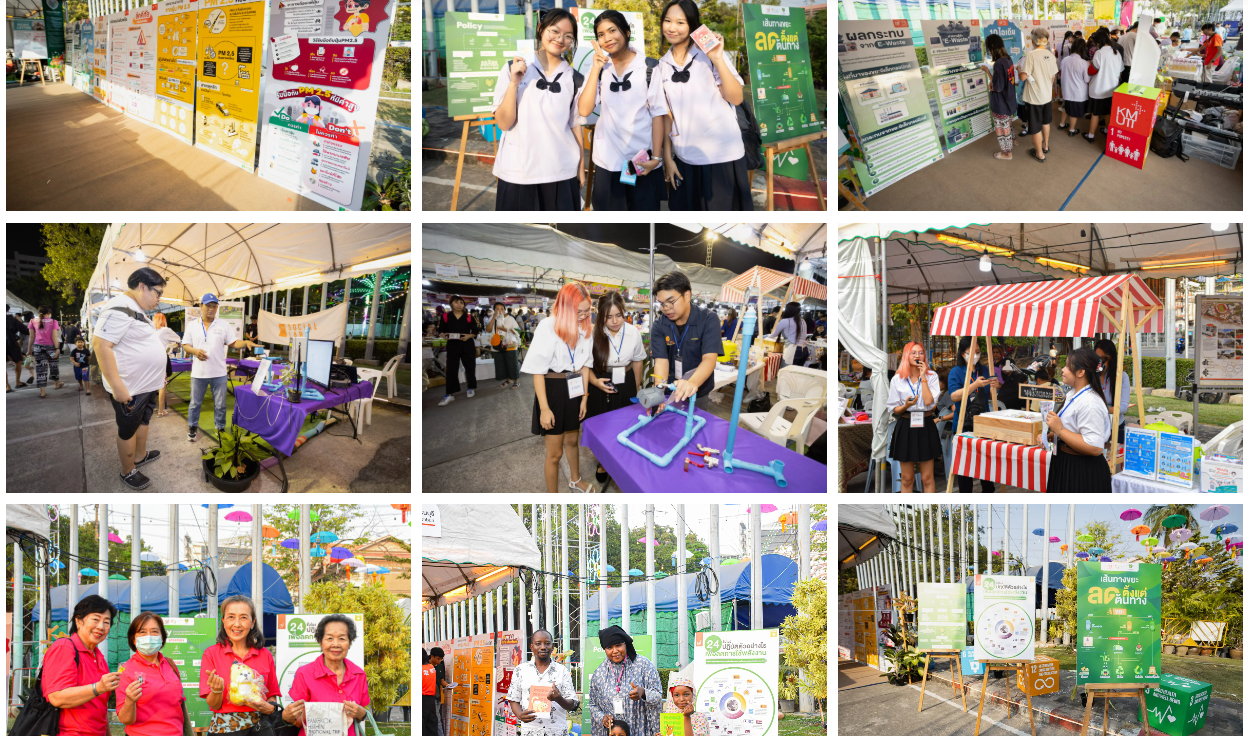
EESH Organizes Energy Awareness Training to Inspire Organizations Toward Sustainable Energy Conservation
The Energy, Environment, Safety, and Health Center (EESH), in collaboration with Innovation Technology Co., Ltd., is organizing a training program titled “Participatory and Sustainable Energy Management in Organizations” under the theme “Raising Energy Conservation Awareness in Organizations”. The training will take place on December 11, 2024, from 9:00 AM to 4:00 PM in Room 11.7, 11th Floor, KX Building.
This program aims to promote knowledge, understanding, and energy conservation awareness among staff, officials, and contract employees of King Mongkut’s University of Technology Thonburi (KMUTT). It emphasizes the importance of collaborative efforts within organizations to enhance energy efficiency.
The training will cover various topics, including practical energy awareness workshops, brainstorming sessions to create energy conservation campaigns, and learning how to calculate electricity costs to evaluate home energy consumption.
This initiative aligns with the government’s policy to encourage energy reduction across all sectors. It also supports KMUTT’s objective of becoming a model organization for sustainable energy and environmental practices.
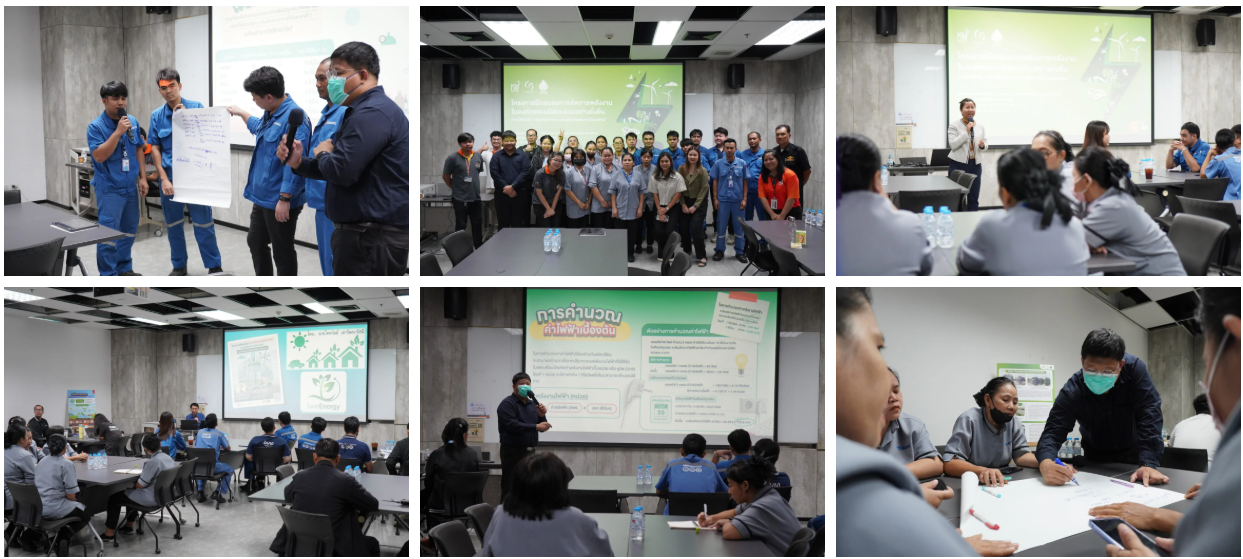
Loy Krathong 2024: A Festival of Culture and Sustainability
The Energy, Environment, Safety and Health Center (EESH) hosted “Loy Krathong 2024” under the theme “Festival of Water: Crafting a Culture of Sustainability” on November 17, 2024. This event highlighted the importance of preserving Thai traditions while ensuring environmental sustainability, aligning with the university’s commitment to the UN Sustainable Development Goals (SDGs).
Key Highlights of the Event:
- Eco-Friendly Krathongs Workshop:
Led by the Green Heart student group, this hands-on activity encouraged participants to create sustainable krathongs from natural and recycled materials. KMUTT collaborated with local farmers from the Phutthabucha community, who provided natural materials to support the workshop.
- Eco-Friendly Krathongs Workshop:
- Promoting Circular Economy Practices:
A total of 1,457 krathongs were used during the event, with 997 of them being reusable, significantly reducing waste by 68.4%. The EESH Center also provided 460 krathongs for participants, promoting sustainable practices while celebrating this beloved Thai tradition.
- Promoting Circular Economy Practices:
Driving Sustainability Goals:
This initiative supports KMUTT’s roadmap to achieving the SDGs 2030, with a focus on:
- Goal 12: Sustainable consumption and production patterns.
- Goal 13: Raising awareness about limited resources and preparing for climate change impacts.
- Goal 14: Conservation and sustainable use of water resources.
By celebrating Loy Krathong with an eco-friendly approach, KMUTT demonstrated how tradition and sustainability can go hand in hand, inspiring the community to embrace meaningful cultural practices that protect the environment for future generations.
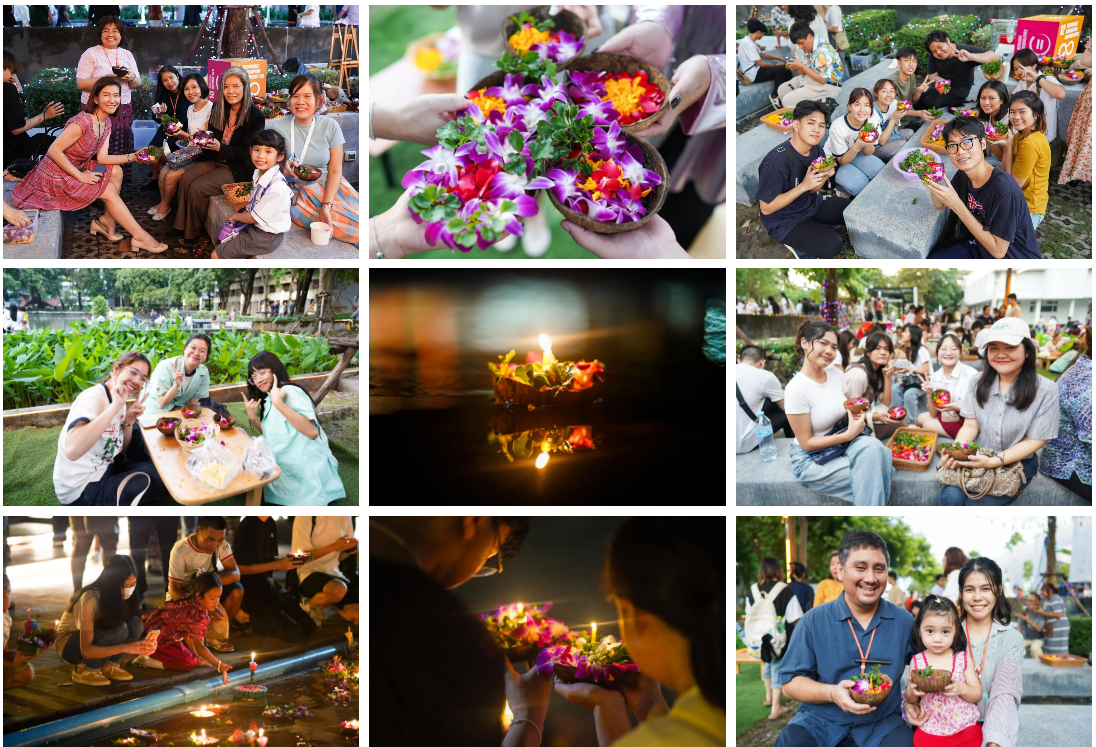
EESH Supports Student Development through Fsci-Innovation #1: Inspiring Green Innovations
On October 5, 2024, the Faculty of Science Student Club at King Mongkut’s University of Technology Thonburi (KMUTT) hosted the “Fsci-Innovation #1” competition, under the theme “Green Heart”, at the Science Connect Room. The event invited the Energy, Environment, Safety, and Health (EESH) Management Center to lead a workshop and deliver insights on environmental issues and solutions to inspire student innovation.
Empowering Students as Green Leaders
The workshop aimed to raise awareness among Green Heart student leaders, equipping them with the knowledge and tools to design activities that promote energy conservation, environmental sustainability, and safety. The event fostered teamwork across disciplines, encouraging students from various faculties to integrate their expertise to develop impactful projects.
Key Objectives of Fsci-Innovation #1:
- Promoting Sustainable Innovation:
Students were challenged to create actionable and ongoing initiatives that support KMUTT’s vision of becoming a sustainable Green University.
- Promoting Sustainable Innovation:
- Encouraging Collaboration:
The competition emphasized interdisciplinary teamwork, highlighting the value of diverse perspectives in addressing sustainability challenges.
- Encouraging Collaboration:
- Expanding Impact Beyond Campus:
Projects aimed not only to transform the university but also to create lasting change in schools, communities, and society as a whole.
- Expanding Impact Beyond Campus:
Shaping a Sustainable Future
This initiative underscores the university’s commitment to fostering innovation and environmental stewardship. By empowering students to lead and collaborate, KMUTT continues to build a culture of sustainability that inspires action across all levels of society.
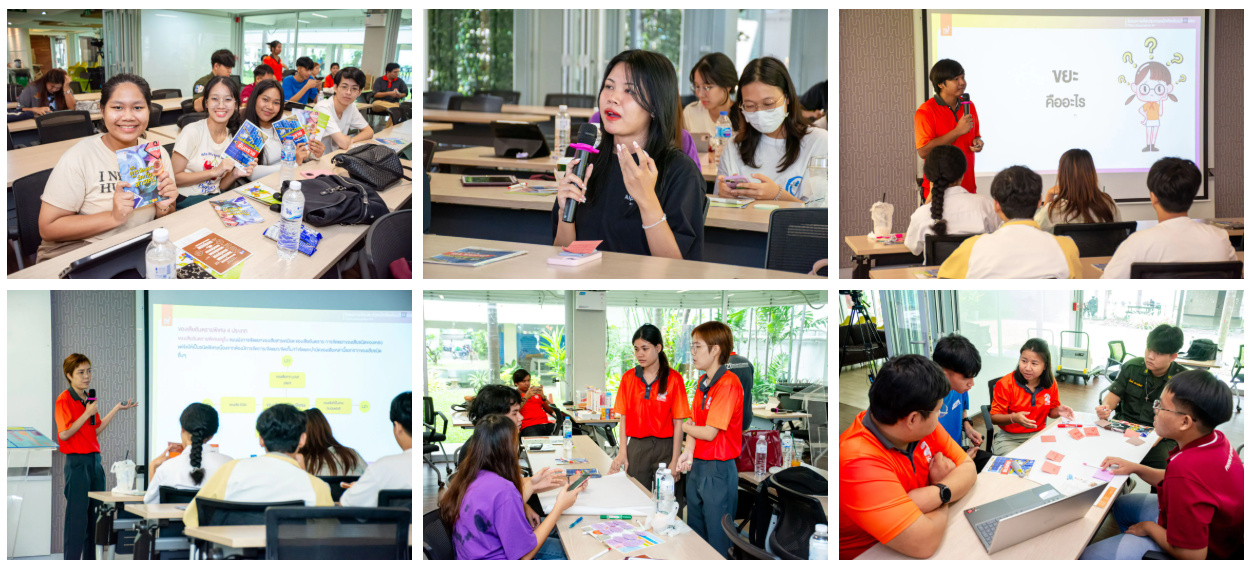
2. Related information on our university having a university Climate Action plan, shared with local government and/or local community group.
King Mongkut’s University of Technology Thonburi has the intention to develop students to graduate with skills in the profession along with morality and to create opportunities for students and personnel to return knowledge, research, along with collaborative operational plans back to the community. Regarding the management system for energy, environment, occupational safety and health for society through the university project with communities and society, causing students and personnel to have activities for learning outside the classroom with the government sector, communities, and private sector. The system is also honing students and personnel to live a generosity life as well as to learn different ways of life in different societies that may not be available in the campus.













Therefore, higher educational institutions, have had to perform great adjustments in the terms of instruction, research, and academic service to be consistent with the changing contexts by adopting operational mechanisms through the University and Community Project which enables the development of KMUTT’s students to form their complete humanity, the capability of teamwork, high flexibility, and high quality of graduate who could be relied upon by socials by supporting the students and personnel to be qualified as lifelong learners through the Social Lab conducted in the area around KMUTT and the expanded area of KMUTT Bang Khun Thian and KMUTT Ratchaburi including the areas in the Royal Project and Royal Thought Project. KMUTT places importance on building the leaders of change through consecutive operational mechanisms or long-term embedded operations to improve the capabilities of its personnel and graduates to be equipped with understanding, accessibility, and in-depth experiences in fieldworks resulting in social engagement and individual passion to form a part of the utilization of sciences and technologies to solve social issues and to be lifelong learners within the current contexts of which the changes are rapidly and severely emerge.



3. Related information on our university on participating in co-operative planning for climate change disasters, working with government.
In 2024, there were 8 KMUTT personnel supporting planning for climate change disasters working with government
| Name | Surname | Ministry / Organization | Title |
| สันติ SANTI | เจริญพรพัฒนา CHAROENPORNPATTANA | กระทรวงการอุดมศึกษา วิทยาศาสตร์ วิจัยและนวัตกรรมอุดมศึกษา วิทยาศาสตร์ วิจัย และนวัตกรรม Ministry of Higher Education, Science, Research and Innovation | คณะอนุกรรมการ subcommittee |
| สำนักงานคณะกรรมการส่งเสริมวิทยาศาสตร์ วิจัยและนวัตกรรม(สกสว.) Thailand Science Research and Innovation | คณะที่ปรึกษา Advisor | ||
| กัญญวิมว์ KANYAWIM | กีรติกร KIRTIKARA | สำนักงานสภานโยบายการอุดมศึกษา วิทยาศาสตร์ วิจัยและนวัตกรรมแห่งชาติ (สอวช.) Office of National Higher Education Science Research and Innovation Policy Council | รักษาการผู้อำนวยการหน่วยบริหารและจัดการทุนด้านการพัฒนากำลังคน และทุนด้านการพัฒนาสถาบันอุดมศึกษา การวิจัยและการสร้างนวัตกรรม (บพค.) สอวช. Director, Program Management Unit |
| ธีรณี TIRANEE | อจลากุล ACHALAKUL | สถาบันส่งเสริมการวิเคราะห์และบริหารข้อมูลขนาดใหญ่ภาครัฐ Government Big Data Institute | ผู้อำนวยการสถาบันส่งเสริมการวิเคราะห์และบริหารข้อมูลขนาดใหญ่ภาครัฐ กระทรวงดิจิทัลเพื่อเศรษฐกิจและสังคม Director of the Institute for the Promotion of Big Data Analysis and Management, Government Sector Ministry of Digital Economy and Society |
| บัณฑิต BUNDIT | ทิพากร THIPAKORN | กระทรวงศึกษาธิการ Ministry of Education | ช่วยราชการกระทรวงศึกษาธิการ Assistant to Ministry of Education |
| ประเสริฐ PRASERT | คันธมานนท์ KANTHAMANON | กระทรวงศึกษาธิการ Ministry of Education | ช่วยราชการกระทรวงศึกษาธิการ Assistant to Ministry of Education |
| พงศ์พันธ์ PONGPAN | แก้วตาทิพย์ KAEWTATIP | สำนักงานคณะกรรมการส่งเสริมวิทยาศาสตร์ วิจัยและนวัตกรรม Thailand Science Research and Innovation | ผู้อำนวยการกลุ่มภารกิจพัฒนาระบบและเครือข่ายวิทยาศาสตร์ วิจัยและนวัตกรรม Director |
| วิทูร VITOON | อุทัยแสงสุข UTHAISANGSUK | สำนักงานพัฒนาวิทยาศาสตร์และเทคโนโลยีแห่งชาติ(สวทช.) National Science and Technology Development Agency | ผู้ช่วยผู้อำนวยการหลักสูตรโครงการ TAIST-Tokyo Tech Assistant Director TAIST-Tokyo Tech Project |
| เชาวลิต CHAOWALIT | ลิ้มมณีวิจิตร LIMMANEEVICHITR | Office of Natural Resources and Environmental Policy and Planning, Ministry of Natural Resources and Environment | Expert committee to perform duties in considering environmental impact assessment reports |
| ณัฐพงษ์ Nattapong | ชยวัฑโฒ Chayawatto | สภานโยบายการอุดมศึกษาวิทยาศาสตร์ วิจัยและนวัตกรรมแห่งชาติ (สอวช.) Office of National Higher Education Science Research and Innovation Policy Council (NXPO) | อนุกรรมการผู้เชี่ยวชาญนโยบายอาวุโส Specialist |
| อุษา Usa | ฮัมฟรี่ Humphries | กระทรวงทรัพยากรธรรมชาติและสิ่งแวดล้อม Ministry of Natural Resources and Environment | คณะทำงาน Working Group |
4. Related information on our university on informing and supporting local or regional government in local climate change disaster/risk early warning and monitoring.

Carbon Neutrality or Net Zero carbon emissions is one of the problem-solving models for the current seriousness of the climate change situation. A lot of organizations in many countries are increasingly aware of and have started making mitigation plans to tackle this severe problem. King Mongkut’s University of Technology Thonburi (KMUTT) as an educational institution responsible for disseminating new knowledge to society and taking part in driving the country’s policies, has prepared to deal with the global climate change resolving policy which is relevant to one of the KMUTT’s sustainability strategies. KMUTT also aims to be a part of an important movement that contributes to Thailand’s achievement in Carbon Neutrality Goals by the year 2050 according to the declaration of intent ‘KMUTT Carbon Neutrality 2040’ announced on November 2, 2021.

According to the study results and the collected data based on different scenarios of KMUTT policies on carbon dioxide emissions in 2019 (base year), KMUTT released about 16,720 tons of carbon dioxide, both direct and indirect emissions, resulting from the organization of various activities in all 4 campuses including KMUTT Bangmod, KMUTT Bang Khun Thian, KMUTT Ratchaburi, and KX Building (KX). The highest proportion of KMUTT carbon dioxide emissions is from electrical use which accounted for 94% of total emissions. KMUTT has launched its action plans for implementing the carbon dioxide emission measures to achieve its Carbon Neutrality goals by 2040. Those measures include the improvement of Energy Efficiency in all buildings by managing the electrical usage, developing smart building integration with the Renewable Energy and Energy Storage System which will lead to the Net Zero Energy Buildings, developing the District Cooling System and the “So Cool” Project for decreasing the temperature inside KMUTT by 1-2 degree Celsius, producing electricity from Renewable Energy by installing Solar PV panels on all potential building rooftops, changing KMUTT cars and buses to EV, conducting the Zero Waste Projects to reduce the amount of waste sent out for disposal through refusing to use single-use plastic measures, 3R measures, producing Refuse Derived Fuel (RDF) from waste and applying Circular Economy concepts.



The university alerted the PM 2.5 situation to students, personnel, and communities nearby the university. Regarding the amount of PM 2.5 which exceeded the standard value (50 mg / m3), which was in the level that begins to affect health.
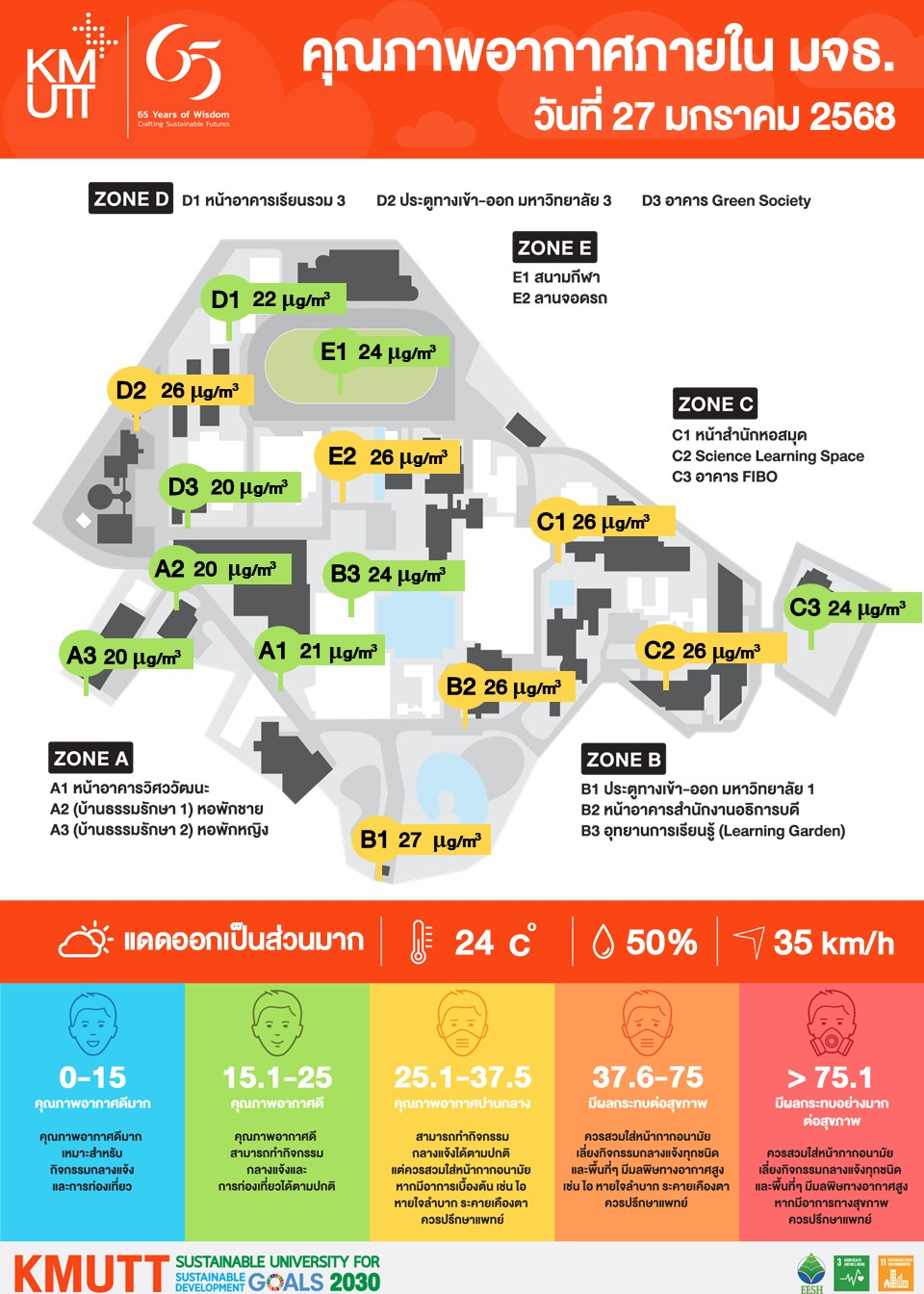
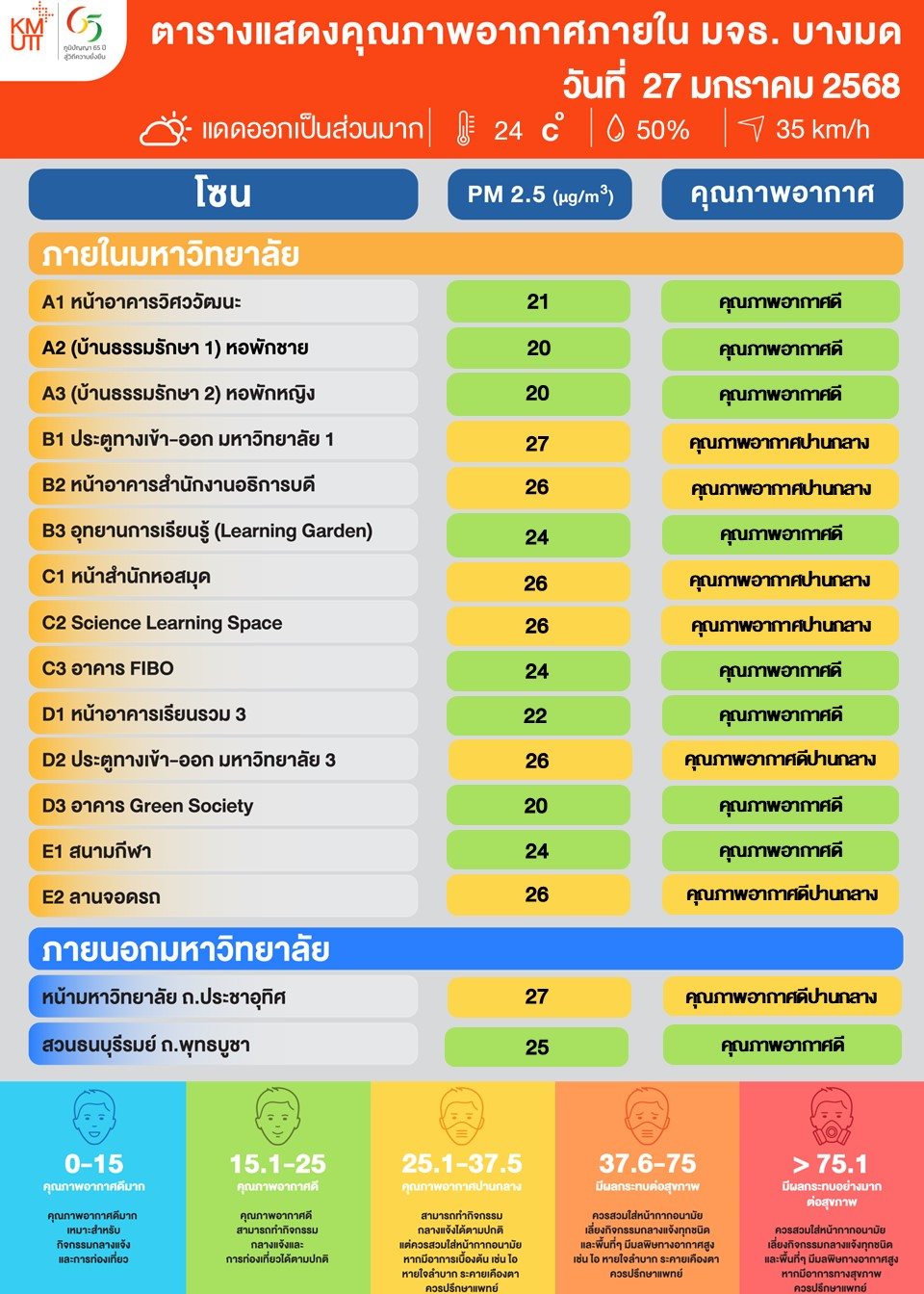
programes Inform and support government
1.Development of Thailand’s Air Pollutants and Greenhouse Gases (GHGs) Emission Inventory and Projection for Air Quality Simulations and Future Energy Related Emission Reduction Assessment (PhaseVII)
This project aims to develop Thailand’s air pollutants and greenhouse gases (GHGs) emission inventory and projection for use in air quality models, in order to (1) assess air quality related issues at national and regional levels, in particular surface ozone and haze pollutions; (2) evaluate level and trends of key emission sources in Thailand against global and regional emission datasets; (3) document effective emission mitigation options to reduce ozone and haze pollution from energy related sectors over Thailand by developing future emissions under different future national energy demand scenarios; (4) evaluate cost-effectiveness or cost-benefit of emission mitigation options through source-receptor relationship analysis using air quality simulations outputs. The outputs and outcome of this project have been used by Pollution Control Department (PCD) to support air quality management policy measures formulation.
2. Estimation of Emission Reduction Potential of Air Pollutants from the Transportation Sector in Thailand
This study aims to better understand the situation of air pollution caused by the transportation sector in Thailand and to grasp an emission reduction potential by introducing emission mitigation measures such as Euro 5/6 in the country. Study results are to be submitted to the Ministry of the Environment of Japan as one of discussion items between the Government of Japan and the Government of Thailand in the environmental management field.
3. Precipitation Modeling in Greater Bangkok with Impact of Urbanized Land Cover and Air Oollution using WRF-Chem-UCM-GBK
This study prepared and configured WRF–Chem–UCM–GBK, a modeling system for advanced precipitation modeling in Greater Bangkok. It incorporates updated land–related data and urban parameters from our previous studies, and the latter supports the use of Single-Layer Urban Canopy Model. For emission data, they include a local inventory for GBK and a global inventory for areas outside GBK. Biogenic and fire emissions were also computed using available WRF-Chem processors. Three precipitation events selected for modeling are a general event in the summer (EV1), a general event in the wet season (EV2), and a heavy event in the wet season (EV3). Two double–nested domains at 10–km and 2–km resolutions and a set of physics and chemistry options were employed. Observation data from a network of stations and satellite-based precipitation data were used to evaluate model performance. For EV1, characterized by frontal precipitation over one single day, the model fails to produce precipitation over GBK due possibly to inability to capture frontal passage temporally. For EV2 and EV3, overall the model performs fairly. Due to the poor model performance in EV1, no reliable assessment can be made for the effects of urban physics and emissions for this event. Turned–off urban physics alone for EV2 tends to give more precipitation within and around GBK systematically partly because moisture is more easily transported to urban perimeters due to less surface roughness and no anthropogenic heat and heat storage by infrastructure are present to enhance convection within GBK. For EV3, abundant moisture dominantly regulates precipitation processes, precipitation difference then becomes less systematic. Turned–off emissions alone in EV2 tends to produce more precipitation within and around GBK, attributed partly to less aerosols to compete for available moisture and in turn large cloud droplets are more viable. But EV3 has less precipitation within GBK due partly to less aerosols to take up moisture to form clouds under the abundant moisture condition. Both turned–off urban physics and emissions appears to give the synergetic effects. These findings directly suggest the effects to be dependent on the type of precipitation event. In the end, a number of recommendations for future work are given.
4. Bilateral Cooperation Between Japan and Thailand on Air Quality Improvement for Thailand This report aims to synthesize the processes and outputs/outcomes from the bilateral cooperation between Japan and Thailand on air quality improvement for Thailand, based on the results and achievements of the 2- year project entitled the Japan-Thailand Clean Air Partnership (JTCAP) Phase I, conducted during the Japanese fiscal years 2018 and 2019
5. Related information on our university on collaboration with NGOs on climate adaptation.
King Mongkut’s University of Technology Thonburi (KMUTT) stands as one of Thailand’s leading institutions, recognized globally for its excellence in research, innovation, and education. KMUTT’s dedication to advancing science and technology is reflected in its impressive performance in international rankings and its continuous efforts to serve both the academic and industrial communities.
Global Recognition and Academic Excellence
KMUTT has earned a prestigious spot in global rankings, including THE World University Rankings, where it has been consistently recognized as one of the world’s top universities. From 2012 to the present, KMUTT has been ranked in the top 400 universities worldwide for three consecutive years. This recognition underscores the university’s commitment to research excellence and its standing as a leader in engineering and technology. KMUTT’s Engineering and Technology program was also ranked first in Thailand for two consecutive years in 2018 and 2019.
Furthermore, KMUTT consistently ranks among the top 10 universities in Thailand, affirming its status as a leading academic institution dedicated to providing world-class education and conducting high-impact research. These rankings highlight the strength of KMUTT’s academic offerings and its contributions to global knowledge and innovation.
Social Impact Through Knowledge and Technology Transfer
KMUTT places a strong emphasis on knowledge and technology transfer to the wider community, ensuring that its research not only benefits the academic world but also directly addresses the needs of society, industry, and government. Since 1982, KMUTT has led “University to Community and Society” projects, which aim to solve local and national problems through collaborative research and development.
These projects are designed to serve the needs of the community, and the results are applied in real-world scenarios, positively impacting social, environmental, and economic development. The university works with various external partners, including government agencies, NGOs, and private sector organizations, to create tangible benefits for society through technology solutions and innovative research.
Social Labs: Learning for Development
One of KMUTT’s most unique initiatives is the use of Social Labs, where the community and society act as classrooms. These social labs serve as living laboratories where students and faculty engage in problem-solving activities that address societal challenges. By participating in volunteering activities, KMUTT’s students gain practical experience while contributing to the development of the local and national communities. At the same time, these social labs allow students to apply their academic knowledge in real-life situations, thus enhancing their learning experience and fostering their personal growth.
Research, Innovation, and Collaboration with Industry
KMUTT’s commitment to high-impact research is not limited to academic discovery; it is aimed at creating solutions that address the needs of government, industry, and society. The university’s Research, Innovation, and Partnership Office plays a pivotal role in managing and supporting research initiatives. The office oversees the establishment of research clusters, laboratories, and partnerships that drive forward innovation across diverse fields. It is also responsible for bringing in distinguished visiting professors, post-doctoral researchers, and other experts to enrich KMUTT’s academic environment and strengthen its global network.
KMUTT’s research efforts are supported by state-of-the-art facilities and advanced research equipment, all of which contribute to the university’s mission to produce groundbreaking research. To ensure the quality of research and foster collaboration across disciplines, KMUTT has established the International Research Advisory Panel (IRAP). This panel provides guidance and expertise aimed at enhancing the quality of research and promoting global partnerships.
Industry Partnerships and Talent Mobility
KMUTT recognizes the importance of fostering strong connections with the industrial sector to ensure that its research addresses the practical needs of the economy. The university has established 67 partnerships with both existing and new businesses, including prominent companies such as Betagro Public Company Limited, IRPC Public Company Limited, and Siam Cement Public Company Limited. These collaborations facilitate joint research initiatives, technology transfer, and the development of innovative solutions that can be applied to real-world challenges.
The Talent Mobility Project is another initiative that bridges the gap between academia and industry. Through this program, KMUTT encourages its researchers to work directly with enterprises to align research projects with industry needs. The project not only provides valuable research opportunities for students and faculty but also ensures that KMUTT’s research remains relevant and impactful, leading to the commercialization of products and technologies that can drive economic growth and societal development.
Fostering Entrepreneurship and Innovation
KMUTT is also committed to promoting entrepreneurial thinking among its students. The Hatch Center, a key initiative of the university, is dedicated to nurturing entrepreneurial skills and supporting students who wish to transform their ideas into viable businesses. The center organizes business incubation programs, entrepreneurial workshops, and training sessions, helping students develop the necessary skills to launch their own startups. Through these initiatives, KMUTT encourages students to engage in innovation, creativity, and entrepreneurship, creating a new generation of leaders who can drive economic and social change.
KMUTT stands at the forefront of research, innovation, and industry collaboration in Thailand, with a clear commitment to addressing global challenges such as climate change, sustainable development, and economic growth. Through its ongoing efforts in knowledge transfer, partnerships, and entrepreneurship, KMUTT continues to shape the future by fostering innovation that not only benefits academia but also contributes to the economic development and social progress of Thailand and beyond.
As we move further into 2024, KMUTT remains dedicated to maintaining its position as a leader in higher education, research, and industry collaboration, continuously striving to produce innovative solutions that meet the evolving needs of society and industry.









13.4 COMMITMENT TO CARBON NEUTRAL UNIVERSITY
1. Related information on our university have a target date by which it will become carbon neutral according to the Greenhouse Gas Protocols

Declaration of Intent ‘KMUTT’s Race to Carbon Neutrality by 2040’
Climate change is one of the greatest challenges we are facing nowadays. Together with many countries around the world, Thailand has joined the Paris Agreement and put forward its best efforts to reduce greenhouse gas emissions to combat climate change. With the strong intention of Thailand to become a low carbon and climate resilient society, Prime Minister announced at the 2021 United Nations Climate Change Conference (COP26) in Glasgow, Scotland, on November 1st, 2021, Thailand’s commitment to reach Carbon Neutrality by 2050 and to reduce all greenhouse gas emissions to net zero by 2065.
KMUTT has a clear policy to strive to become a Sustainable University based on the Sufficiency Economy Philosophy and the UN Sustainable Development Goals. One of the important goals of KMUTT Sustainability strategy is to reduce its carbon emissions to net zero emissions by 2040 under the “KMUTT’s Race to Carbon Neutrality by 2040” initiative through the increased use of renewable energy, enhancement of energy efficiency in building and transport, efficient use of resource and recycle and forest carbon sequestration. The committee and working group to drive KMUTT to net zero carbon emissions, appointed as a special taskforce for this initiative, now develop strategic and action plans as well as monitor and evaluate the plans to reach the expected targets. The working team will promote, support, and coordinate with all internal units and communities around KMUTT for their participation and cooperation, both in planning and implementation stage.
“KMUTT’s Race to Carbon Neutrality by 2040” will be a new strategic goal for KMUTT sustainability which is integrated with the other five key strategic goals including student engagement, research and innovation impact, community engagement, green university and infrastructure, and sustainable management. Carbon Neutrality will become a part of our working style and organizational culture. Everybody will have an understanding and awareness of the climate change and its impact and be willing to help mitigate it.
With the clear intention to move the organization forward to net zero carbon emissions, KMUTT has been invited to be a founding member of RE100 Thailand Club initiated by the Federation of Thai Industries. KMUTT has also joined Thailand Carbon Neutral Network, founded by Thailand Greenhouse Gas Management Organization and the global campaign “Race To Zero”, which emphasize that, as an educational institution, we are ready to commit to the public both in national and international networks that all the KMUTT campuses are trying to achieve net zero carbon emissions at the organizational level.
Assoc. Prof. Dr. Suvit SeaTia
President , KMUTT
November 2021
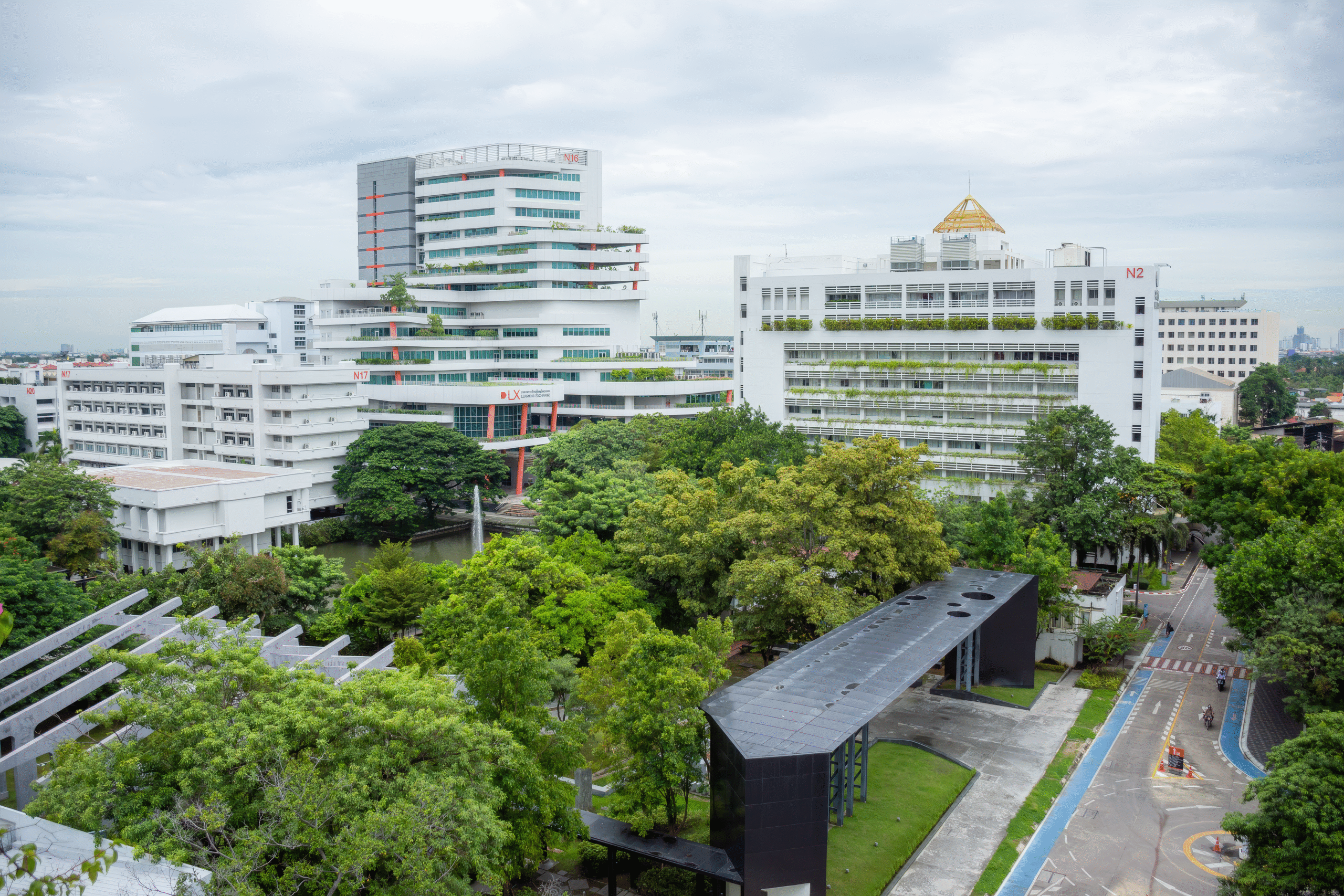
SDG 13: Climate Action
Overview of Operations at King Mongkut's University of Technology Thonburi (KMUTT)
Carbon Neutrality 2040
Strategic roadmap aiming for Net Zero by 2040, aligning with national 2065 targets.
Zero Waste to Landfill
Policy emphasizing segregation, recycling, composting, and biogas conversion.
Green Building Standards
LX, UX, KX, and BRI buildings adhere to LEED/TGBI standards for energy efficiency.
100% Renewable Energy
Targeting 100% renewable electricity by 2040, supported by solar rooftop expansion.
Low-Carbon Transport
Promotes EV shuttles, bike-sharing, pedestrian walkways, and EV charging stations.
Carbon Management
Implements precise accounting, monitoring (MRV), and campus-level offset mechanisms.
Energy Conservation Training
EESH-organized training (Sep 2025) on energy management systems for students.
Carbon Footprint Workshop
"GO GREEN Together" (Aug 2025) focused on GHG reduction and carbon calculation.
"Beat Plastic Pollution"
World Environment Day 2025 campaign exchanged 12.7 kg of waste for potted plants.
AGRI-PV Seminar (Apr 2025)
Explored integrating solar PV with agriculture for dual energy and food production.
Nature Camp (ENVI-SCI #3)
Student-led camp (Mar 2025) featuring reforestation and biomass composting workshops.
Eco Loy Krathong (2024)
Promoted natural materials, reducing waste by 68.4% through reusable items.
Carbon Capture (CCUS)
Research on capture technology, biochar applications, and mangrove sequestration modeling.
Carbon Sink Initiative
Collaborative restoration of coastal mangroves to serve as natural carbon sinks.
GHG in Construction
Life Cycle Assessment study on emissions from low-income house construction.
Air Pollutants Inventory
Development of national emission inventory to support Pollution Control Department policy.
Urban Climate Modeling
WRF-Chem modeling of precipitation and air pollution in Greater Bangkok.
Transport Emission Study
Estimation of emission reduction potential from the transport sector (submitted to Japan MOE).
Ahead of National Target
Aiming for Carbon Neutrality by 2040, 25 years ahead of Thailand's 2065 goal.
>300 kW Solar Capacity
Installed capacity across Bangmod, Bang Khun Tein, and Ratchaburi campuses.
62% Waste Diversion
Successful diversion rate achieved through zero-waste programs and recycling.
48% Plastic Reduction
Year-over-year reduction in single-use plastics across campus operations.
EV Infrastructure
Established charging stations at key locations and operates zero-emission EV buses.
Global Network Member
Joined Race To Zero, RE100 Thailand Club, and Thailand Carbon Neutral Network.
Carbon Neutrality 2040
A clear commitment to achieve net-zero carbon emissions by 2040 through renewable energy and efficiency.
Energy & Climate
A sustainable energy management system to conserve energy and address climate change directly.
Walking & Cycling
Promotes a campus culture of walking and cycling to enhance health, safety, and reduce emissions.
Green University
Commits to leadership in sustainability, creating mechanisms to develop change agents for a better quality of life.

